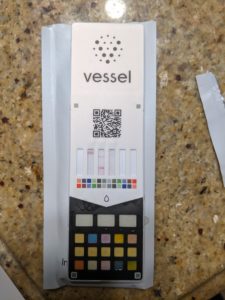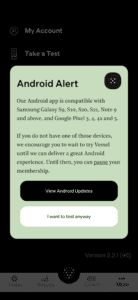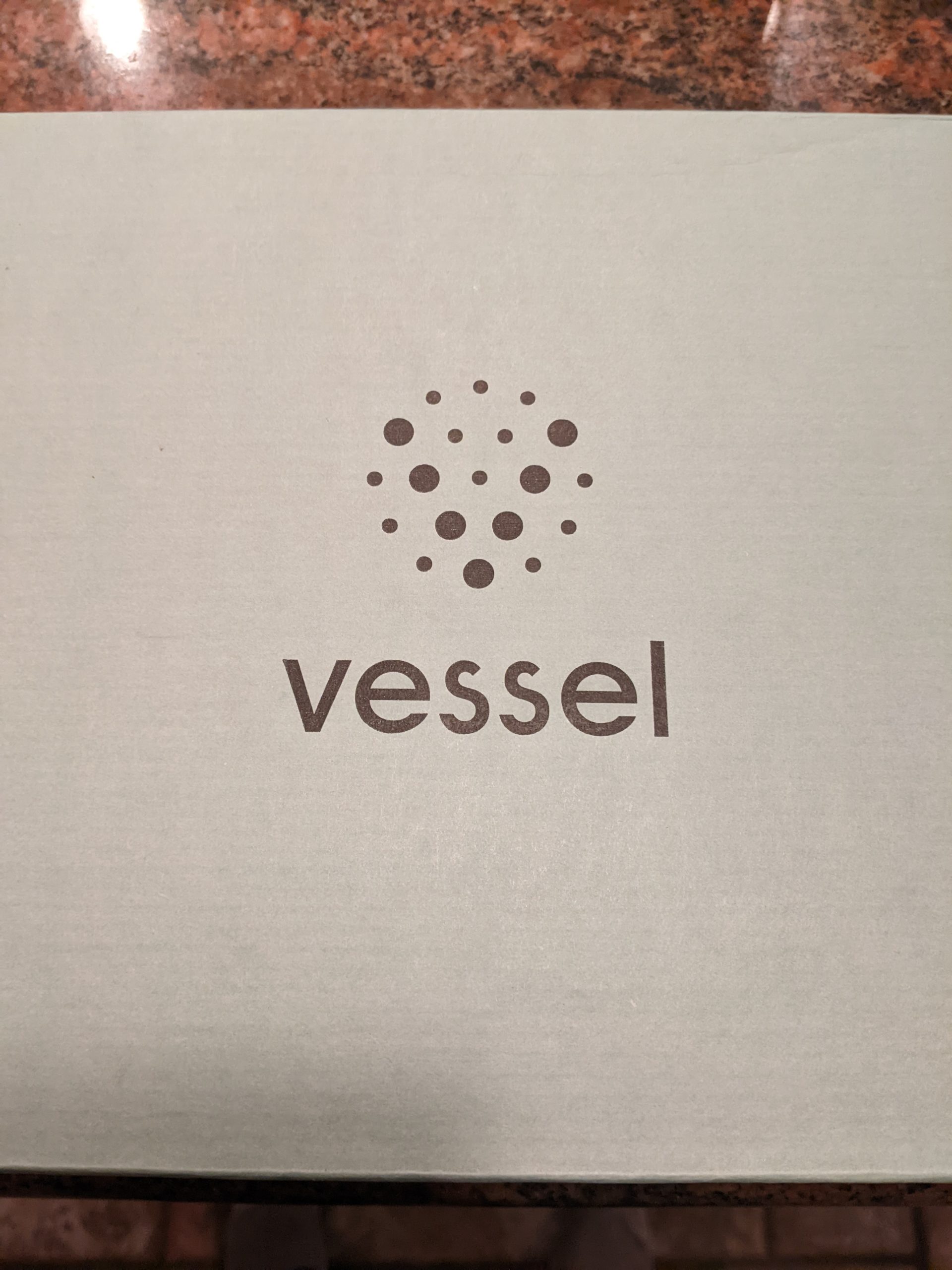I discovered Vessel Health while looking for a way to monitor my cortisol levels. As with many of these things, I was skeptical at first, but still very eager to give it a try. I contemplated signing up for months. Eventually, I got a discount for a month’s supply of test cards. I already had blood work scheduled, so I purchased a Thorne Stress test and decided to compare all three. This gave me the perfect opportunity to try it out and see how accurate it was.
What is it?
The portion of the Vessel Health system that I was most interested in consists of an Android app and ‘Wellness Test Cards’. Vessel Health also provides lifestyle and food plans in the app as well as a supplement service.
The Wellness Test Cards are essentially an ‘at home’ urine test. They take an innovative approach in that, rather than having to send them for analysis, they use the Vessel Health app combined with your mobile device camera to interpret your results. You might be able to understand now where some of my skepticism stemmed from.
In addition to cortisol, the version of the Wellness Test Cards that I used was able to test Vitamin C, Magnesium, Ketone B (BHB), Vitamin B7 (Biotin), Hydration, Ketone A (AcAc), and pH. At this time, I was also looking for a cheaper/less invasive way of measuring ketones and also had interest in my Biotin and Magnesium levels. Since I’ve used Vessel Health, they’ve added additional support for Calcium and Sodium.
How do you use it?
The app provides a very thorough walkthrough regarding how to use the Wellness Test Cards. If you trust your aim, you could do your business right on the test card, but note that there are ‘wet’ and ‘dry’ zones that apparently will skew results if you intermix them. I opted to use a cup and then dunk my test card for the time needed to measure the results. Next, you allow the test card to dry and then you can snap a photo of the card from within the app. After a few moments, you can analyze your data. The app will then present you a number of food and lifestyle options that you can choose to incorporate in order to get your scores in a more optimal range. The app provides a facility for tracking your progress across tests.

How well did it work?
The version of Vessel Health that I tried gave me a general range rather than pinpoint values that I could directly compare to my bloodwork/other tests. I’m used to this with many of the other devices I use and don’t have a problem with comparing the relative values of regularly taken tests with the same device. It seems that the current version is more explicit about the values, but I have not been able to test that. In general, the results from Vessel Health were in the range of what was shown by my blood work/other tests. It worked well enough that I was definitely interested in continuing to use Vessel Health on a regular basis… especially as the costs of the Wellness Test Cards became more affordable and/or the number of tracked biomarkers increased. Unfortunately, this never happened as I will go into more detail below.
What didn’t work/could be improved?
There were a handful of things that I didn’t like about my Vessel Health experience. Ultimately, one of these was completely out of my control and the others made me investigate other options to ultimately find better solutions.
Android App
Pretty much all apps in the health/bio-hacking space on Android SUCK. As a former Android developer, this is a personal pet peeve of mine. Many companies either don’t put out an Android app or release theirs as an afterthought. This usually results in an app that is so buggy as to make it unusable. Aside from the introduction piece that shows you how to use the Wellness Test Cards, Vessel’s Android experience was the same… sometimes worked, most of the time didn’t… would not maintain state, did way too much on the UI thread, etc. all of the usual issues that are made by amateur Android developers. Once I figured out the things that you should never do in the app, I could deal with it… until I upgraded my phone and got this:

That’s right… they’re still targeting two full generations behind the current flagship devices made by Google. This is definitely a deal breaker for me.
No Data Export Capability
Regular readers know that I run all of my Quantified Self data analysis from Google Fit. There is no Google Fit integration with Vessel Health. Even worse, there doesn’t appear to be any way to export the data in any form. I’ve been burned by enough crowd sourced devices from companies that disappeared overnight. Providing a way for me to get my data, when the product is no longer supported is critical for me. I tried to load my old data in the app while writing this review. It appears that it’s been lost and is currently unretrievable.
Conclusion
Ultimately, the poor app experience is what forced me to stop using Vessel Health. During the time that I had a phone that it worked on, while frustrating, I enjoyed the experience. I would gladly continue to pump money into this in order to reward a company moving this technology forward. What would it take for Vessel Health to be part of my regular testing routine? At a bare minimum, the app/data export issues need to be addressed. I would also like to see a roadmap for any new biomarkers that might be added. I already feel like I have my supplement and lifestyle plan dialed in, so I’m not really interested in another app/company’s take on that. Just let me put my data in the apps that I’m already using for that type of thing.
Have other questions? Have you used Vessel Health? Let me know (unless you’re going to gloat about how great the iOS experience is 😒).

Leave a Reply